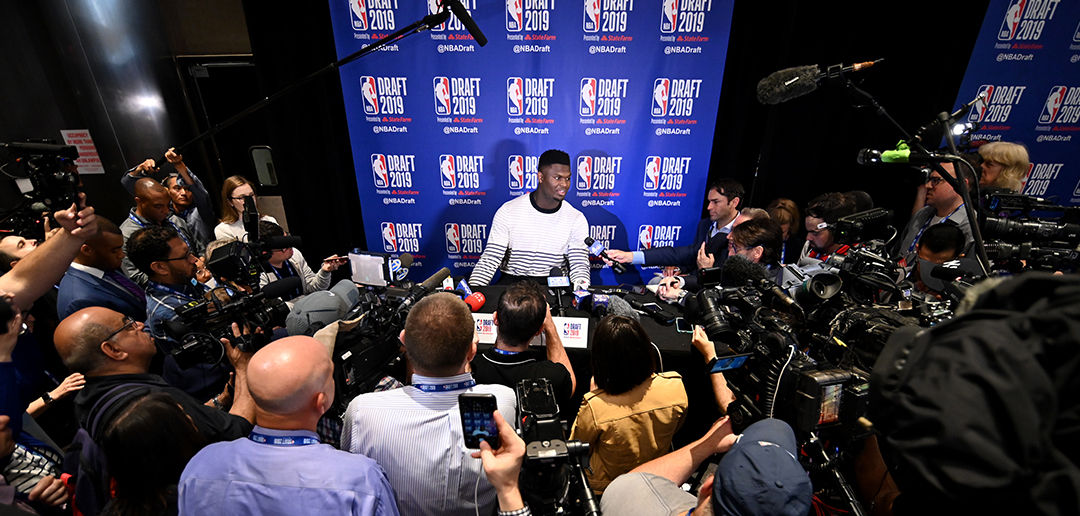The 2019 NBA Draft lacks the sizzle of intrigue that typically accompanies such events ⎯ everyone in the world knows that Zion Williamson and Ja Morant are going first and second, respectively ⎯ but that hasn’t stopped sports media from parading out one mock draft after another.
Draft speculation has become an American sporting rite of passage, one certainly not limited to the NBA. ESPN employs two contributors who solely focus on year-round prediction and analysis of the NFL Draft, and the NFL Network broadcasts the entirety of the four-day Scouting Combine that precedes it, plus eight hours of related press conferences.
Draft conjecture isn’t the only instance of what we might call “speculative fandom.” NBA free agency buzz ramps up during the summer months, but even before last season tipped off, fans and pundits alike breathlessly hypothesized about the 2020 destinations of Durant, Leonard, and Irving, among others. In college sports, recruiting dominates fan conversations, and national signing day has a holiday-like feel. Europe has its own version of speculative fandom in the soccer transfer market. I could go on, but doing so would steal time from my scouring of MLBTradeRumors.com.
The oversaturation of speculation borders on ridiculous, but I happily indulge. Obviously many others do as well. It’s worth pausing to ask why. Why has this corner of the sports universe blossomed into such a hive of zealous scrutiny?
I don’t claim to have a full answer, but, as you might have already guessed, I’ve pondered it a bit.
My hypothesis is that “speculative fandom” taps into an innate, primal element of our humanness: the unquenchable inclination to hope.
At the end of every season, in every league, only one team stands tall as champion. Those that fall short form an assortment of, to put it bluntly, failures. Some had a great year that ended in disappointment, while others performed miserably. Some grossly under-achieved lofty expectations; others exceeded even the rosiest of predictions but still failed to reach the ultimate pinnacle.
Fans can enjoy the journey of a season that doesn’t result in a crown, but our culture, which prizes winning as “the only thing” and aches to identify who is “the greatest,” makes it difficult to subsist long on the joy of the journey.
But “hope springs eternal,” and in sports this doesn’t just apply to the buoyant days of training camp. Mock drafts and recruiting rankings and the like allow fans to envision what their team may look like five, seven, even ten years down the road. What fan of a team stuck in tank mode can resist peering ahead and dreaming of what might be? I should know; the two teams I follow most passionately are the Pittsburgh Pirates and Penn State’s basketball team.
The irresistible pull for sports fans to dream of a bright future is a tangible expression of the human tendency toward hopefulness over hopelessness. We yearn, or even expect, that things will be better in the days to come. We hope because we are human.
At the risk of diving too deeply into cultural analysis and psychoanalysis, I think this phenomenon is one of the most powerful evidences of God’s existence. Let me explain.
Western culture, over several hundred years, has drifted from a dominant worldview of theism (belief in one supreme Creator God), through deism and existentialism, and into the current dominant view of secular naturalism. Put simply, secular naturalism is the philosophy that everything that is can be explained as a product of natural circumstance. Human reason and understanding has rendered supernatural explanations and beliefs obsolete.
This doesn’t mean that the majority of the population holds these beliefs, but that most of the people, institutions, and other forces that shape a culture’s way of thinking do. As a result, this dominant viewpoint filters down through education and media and other influencing agencies like a steady drip, shaping individual beliefs to the point where we adhere to various tenets of naturalism without even knowing it. For example, as a Christian I believe God can do the miraculous, but the emphasis on seeing natural causes behind everything leads me to be instantly and subconsciously skeptical of any such claim. Culture has conditioned my thinking.
Logic would dictate that if naturalism were true, things like morality and purpose would be lost. If the entirety of the universe ⎯ including human life ⎯ is the sum of cold, unthinking natural processes, dust is indeed all we are, and to dust we will return. Achievement, character, progress, nobility, justice ⎯ all of it becomes completely arbitrary. Within this framework, a person’s natural response should be nihilism, or meaninglessness — an abandoning of hope and the reluctant acceptance of our unchangeable mortality.
Yet even the most avowed naturalist does not live this way. Erupting from within every individual, like the eruptions of hope at a bright future for our preferred team, are a tangible sense of right and wrong, an intuitive appetite for justice and fairness, and, yes, hope that persists even when it would seem unwarranted. Even when in the direst circumstances, like the Cleveland Browns in the course of going 1-31 over two seasons, or the bleak internment of Louis Zamperini (depicted in the film Unbroken), hope springs from the human heart.
Why would such an ethereal thing display such great tenacity? Naturalism cannot account for it. The most reasonable explanation is that it is not naturalism that gave it rise; rather, an intelligent and supreme Creator hardwired it into us. And if He has, it logically follows that He created a way for that hope to be realized. This leads us, as so many things do, to Jesus.
Romans 5:1-5 says, “Therefore, since we have been justified by faith, we have peace with God through our Lord Jesus Christ. Through him we have also obtained access by faith into this grace in which we stand, and we rejoice in hope of the glory of God. Not only that, but we rejoice in our sufferings, knowing that suffering produces endurance, and endurance produces character, and character produces hope, and hope does not put us to shame, because God's love has been poured into our hearts through the Holy Spirit who has been given to us.”
These Bible verses show that Jesus provides us hope because He _is_ our hope. Through Him and in Him we find the hope that no matter how greatly we may have failed, God still offers us His love and acceptance. The hope He gives also tells us that the difficulties of our current reality are not permanent; a glorious future with Him awaits. We can obtain these things through reaching out, in the words of the passage, “by faith into this grace” ⎯ by placing our trust in Jesus.
So as you watch the NBA Draft, or follow the recruiting trail, or even squint to find the improbable series of events by which the Pittsburgh Pirates win the World Series, let these sporting hopes lead you to reflect on the truer, better hope offered in Jesus.
Take one more step...
Know where to put your hope.














